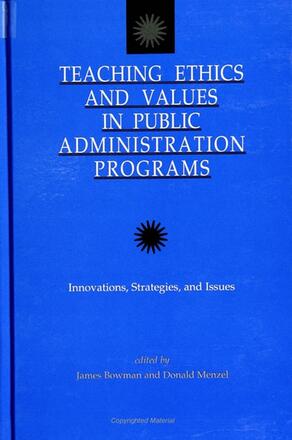
Teaching Ethics and Values in Public Administration Programs
Innovations, Strategies, and Issues
Alternative formats available from:
Provides fresh perspectives on the teaching of ethics and values in public affairs, administration, and business in America's schools of higher education.
Description
This book offers a comprehensive selection of the latest work on teaching ethics in public administration. It presents in-depth original studies on contemporary innovations, strategies, and issues in ethics instruction and examines the most recent efforts to design ethics-education curricula that make an important difference in the lives of professional men and women. The volume features an interesting variety of program innovations from across the nation, and offers an eclectic group of pedagogical strategies, with particular relevance to on-campus learning. The contributors provide examples of ethics training in the field, focusing on three different kinds of practitioners in three different parts of the country, and deal with often-overlooked issues in the teaching of ethics such as program management, faculty-student relations, research, and consulting.
James S. Bowman is Professor of Public Administration at the Askew School of Public Administration at Florida State University, author of Ethical Frontiers in Public Management, and editor-in-chief of Public Integrity Annual. Donald C. Menzel is Professor of Public Administration and Political Science at the University of South Florida at Tampa.
Reviews
"There is something in this book for anyone with any interest at all in public administration ethics. It is very significant because of its emphasis on teaching. There have been a good number of journal articles on the teaching of ethics, but I know of no book that is dedicated to this topic. " — John A. Rohr, Virginia Polytechnic Institute and State University
"Fills an important gap in the literature. The range of coverage, selection of issues, combination of case studies, survey findings, classroom experiments, and theoretical approaches is excellent. Many of us who teach ethics courses in the public sector feel uncertain about how to proceed, about what is likely to work and not work in the classroom, uneasy about certain ethical issues and how best to present them and resolve them, concerned about the absence of suitable texts and supporting materials. This book provides invaluable guidance to aid the public administration teacher and scholar in addressing these issues. It will be useful as a resource aid for college- and university-level courses, as well as in-service training for government, business, and nonprofit workers. " — Jonathan P. West, University of Miami
"What I like most about this book is its innovative approach. It turns the ethics 'lens' on the academy itself. ...The book is distinctive in that it focuses not only on the pedagogy of ethics instruction within the traditional academic classroom framework but deals also with ethics education in a non-degree, continuing education context. Concern for integration of ethics into the curriculum and for teaching ethics effectively is one of the most important issues in public service education today. " — Eleanor V. Laudicina, Kean College of New Jersey